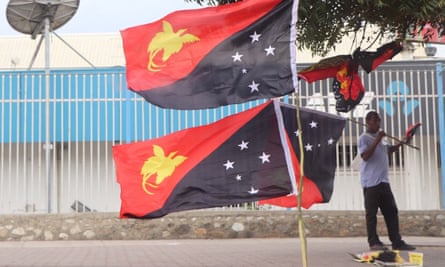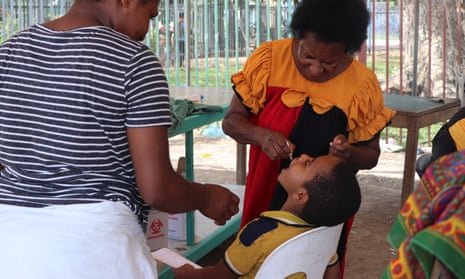At a waiting room in Port Moresby’s Gerehu general hospital red, gold and black balloons – the colours of the country’s flag – deck the walls in the build-up to independence day.
Around the back in the stifling heat, nurses are administering vaccine drops from cool boxes. About 30 adults and children are queuing under a canvas tent, awaiting their dose to protect against polio, a disease Donald Lippert, a Catholic bishop from the Southern Highlands, characterised as “a beast lurking in the darkness, ready to spring forth”.
The number of confirmed cases has risen to 12 up from 10 earlier in the week, and health authorities have confirmed the disease has reached the capital, Port Moresby, after the diagnosis of a six-year-old boy in an area called Five Mile. The other children affected are in remote parts of the country, and the first case surfaced in June.
The health crisis has cast a shadow over the developing Pacific island country as it prepares to celebrate the 43rd anniversary of its independence from Australia on Sunday. Tribal dancing, agricultural shows and flag raising ceremonies are among festivities scheduled.

Nason Aguleko, an accountant, has brought his 16-year-old daughter Catherine to be immunised along with her grandmother.
The family plan to travel to Australia at Christmas to spend time with relatives. A polio vaccination is now part of visa requirements.
Aguleko recalls the lives ruined as a result of the disease when he was growing up. “I’ve seen quite a number of people paralysed from polio over the years,” the father-of-three tells the Guardian. “If someone is affected you can’t support yourself, there is no independence and dreams and aspirations are lost.”
The World Health Organisation declared PNG polio free in 2000. For Generation Y Papua New Guineans, like architect Rita Karaie, 27, there isn’t much awareness about the consequences of the disease. “I don’t even know what the symptoms are,” she says, as she lines up for her turn.
Sister Kenegalato Waligia is a nurse at the hospital and her team has vaccinated 50 to 80 babies each morning this week. “When the outbreak came up we started to see a lot of panicked mothers,” she says. She says more resources are needed to increase PNG vaccination rates.
Over recent years there have been funding cuts to mobile clinics travelling to settlement areas and remote villages to vaccinate children. However, these clinics are set to receive a major boost in the coming months.
The PNG government has instigated a program to vaccinate 3.3 million children under 15, starting in the capital on 24 September and rolling out nationally from 1 October.
There has been some community resentment over healthcare funding being stretched, while the PNG government ploughs millions into hosting world leaders for the Apec summit in November.
Jennifer Elsibai, Save the Children’s Pacific regional director tells the Guardian. “I think that the country is facing really incredible fiscal constraints, and Apec is a very obvious use of the government’s budget and it’s an easy place to direct your anger, especially if you’re a member of a community that is faced with a health facility that isn’t adequate to meet your needs.”
She attributes the outbreak largely to vaccination rates, which had dropped to less than 50% in some parts of the country.
Polio is an infectious disease transmitted through contact with food and water contaminated with the faeces or saliva of infected people. It’s rare in most parts of the world because of the success of immunisation programs but Somalia, Kenya, Congo and Nigeria have recently experienced outbreaks.
Efforts to eradicate polio from Afghanistan and Pakistan have been thwarted because of political instability.









